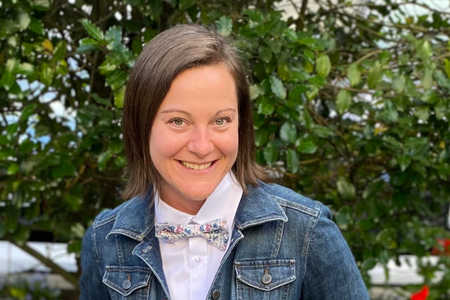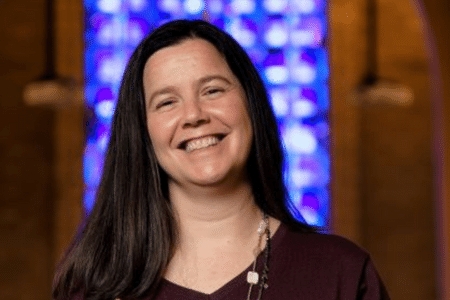
June 21, 2023
A Note from Pastor April
Dear Friends,
I remember the first few times I heard people introduce themselves and include their gender-related pronouns.
“My name is Greg and I use he/him pronouns.”
I was confused. Why was he stating something that (in my mind) appeared to be obvious?
Shortly after, I began to see friends introducing themselves with pronouns I was less familiar with.
“I’m Jane and I use they/them pronouns.”
Now, my English grammar lessons from school were coming to mind. How do we refer to a singular person with a plural pronoun?
What it Means to Be an Ally
One of the things I’ve appreciated over the years during Pride Month is the chance to learn and expand my own understanding about what it means to be an ally in the LGBTQ+ community. It was during a Pride Month worship service where I first heard a helpful explanation for the importance of using proper pronouns.
Pronouns are a way of indicating to others the way in which you see yourself beyond your name and physical appearance, in terms of gender. This is different from your sexuality, which is more about who you find attractive romantically. Gender has more to do with whether feminine or masculine or perhaps both or neither are the labels that best describe your identity.
Most cultures in the world have very binary understandings of gender. There are clear expectations for how a female and male should dress and wear their hair. We have lots of expectations about particular roles that females and males play in society. We have names that are “boy names” and “girl names.” We even have colors, toys, and accessories differentiated by gender. (Just check out the baby section and you’ll know what I mean.)
The tradition in this country is that a person with the name April, whose appearance matches the cultural feminine norms, would be associated with a female.
Most of us were raised with these cultural norms and rarely, if ever, question their merit. For most of my life, I’ve assumed… this is just the way it is.
For me, this works. I was born a female, typically dress according to the female cultural expectations, and wear makeup and long straight hair. I feel like the term “she” fits me and my understanding of self.
But what about someone who doesn’t feel this way? What about someone who doesn’t neatly fit into the social constructs of what we have determined are “male” or “female”?

This year, I’ve deeply appreciated the ways that our seminary intern, Molly Collier, helped us to start exploring this conversation by simply introducing their pronouns.
“I’m Molly, and I use they/she pronouns.”
This was how Molly introduced themselves most of the year. What Molly was indicating is that their understanding of their own gender is broader than just female — it’s genderqueer, which falls under the non-binary umbrella. (Not sure what that means? We’ll be talking more about it this Sunday!)
Molly’s sharing of these pronouns is a vulnerable way that they can indicate to the congregation these things, which allows us to refer to them with pronouns that are an accurate reflection of their identity.
It’s been amazing how this has opened space for dialogue. Over the year, many of you asked questions to me and to Molly about what these pronouns meant. I sensed an earnest willingness to learn and understand something that was new for many of you.
Molly has been gracious in these interactions and certainly patient with me as I sometimes have to correct myself when referring to them, since my default is to always say “she.” It’s definitely a learning curve for most of us, and that’s OK!

When Molly led worship for us on Sunday, June 11, you may have noticed a couple of changes. A new haircut! And updated pronouns.
“My name is Molly and I use they/them pronouns.”
This Sunday, I’m delighted to be doing a dialogue sermon with Molly. We’ll talk more about pronouns and what it means to them to claim a queer, transgender identity.
We’ll do this in the context of the Gospel of Matthew chapter 12 and the response from the crowds toward Jesus and this new movement of the Spirit he was bringing forward.
It’s normal to struggle when things don’t fit what you’ve been taught. If that’s you, that’s alright! We are all still in a process of learning.
June is a Great Time to Ask Questions
June is a great time to ask good questions and expand your own awareness about how to show up to people of all backgrounds with the love of Jesus Christ.
After you hear the dialogue with Molly this Sunday, you might want to explore the Reconciling Ministries Network website, which has a wonderful page filled with resources that can help you learn and discover more.
I’ll be taking a step forward with this myself this Sunday. I will start introducing myself with my pronouns. I’m learning that doing so is a way of indicating to people of all gender identities that I don’t assume that I know how they prefer to be addressed. It helps them to know that I value knowing what their pronouns are, and that it’s a safe space for them to share those.
I hope to see you in worship with us on Sunday at any of our 3 worship services — 9am Traditional Worship in the Sanctuary, 11am Contemporary Worship in the Sanctuary, and this Sunday we have a 12pm service in Warehouse 839. (https://hilliardumc.org/events/warehouse-839-worship-6/)
April
The Rev. April Blaine
Lead Pastor

